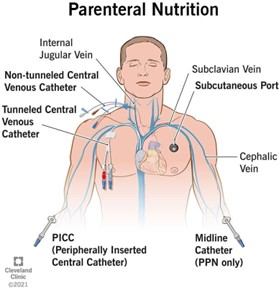Which intervention is most important for the practical nurse (PN) to implement for a client who is receiving total parenteral nutrition (TPN)?
Collect fingerstick glucose levels
Implement bleeding precautions
Obtain daily weights
Check urine for albumin
The Correct Answer is A
a) Collect fingerstick glucose levels. Correct
Collecting fingerstick glucose levels is the most important intervention for the PN to implement for a client who is receiving TPN. TPN is a method of feeding that bypasses the gastrointestinal tract and provides all the nutritional needs of the body through a vein. TPN contains a high concentration of glucose, which can cause hyperglycemia or fluctuations in blood sugar levels. Therefore, it is essential to monitor the client's glucose levels frequently and adjust the infusion rate or insulin administration accordingly.
b) Implement bleeding precautions.
Implementing bleeding precautions is not the most important intervention for the PN to implement for a client who is receiving TPN. Bleeding precautions are measures to prevent or minimize bleeding in clients who have a high risk of hemorrhage due to conditions such as thrombocytopenia, coagulopathy, or anticoagulant therapy. TPN does not directly increase the risk of bleeding, although it may affect the liver function and clotting factors in some cases². Therefore, bleeding precautions are not a priority for a client who is receiving TPN.
c) Obtain daily weights.
Obtaining daily weights is not the most important intervention for the PN to implement for a client who is receiving TPN. Obtaining daily weights is a way to monitor the client's fluid balance, nutritional status, and response to therapy. TPN can cause fluid overload, dehydration, or electrolyte imbalances in some cases²⁵. Therefore, obtaining daily weights is important, but not as important as monitoring glucose levels.
d) Check urine for albumin.
Checking urine for albumin is not the most important intervention for the PN to implement for a client who is receiving TPN. Checking urine for albumin is a way to detect proteinuria, which is an indicator of kidney damage or disease. TPN does not directly cause kidney problems, although it may affect the renal function and urine output in some cases². Therefore, checking urine for albumin is not a priority for a client who is receiving TPN.
 |
Nursing Test Bank
Naxlex Comprehensive Predictor Exams
Related Questions
Correct Answer is ["B","C","D","E"]
Explanation
Choice A reason: Epidemiology interprets legislation in the community is not a statement that indicates the importance of epidemiology to the community health nursE. Epidemiology does not deal with legal issues, but rather with scientific methods and evidencE.
Choice B reason: Epidemiology relates to the health status of a population is a statement that indicates the importance of epidemiology to the community health nursE. Epidemiology measures and monitors the frequency, distribution, and trends of diseases and health indicators in a population.
Choice C reason: Epidemiology analyzes and examines the root causes of health outcomes is a statement that indicates the importance of epidemiology to the community health nursE. Epidemiology identifies and investigates the factors and interactions that influence the occurrence and prevention of diseases and health conditions.
Choice D reason: Epidemiology evaluates the effectiveness of nursing interventions is a statement that indicates the importance of epidemiology to the community health nursE. Epidemiology designs and conducts studies to assess the impact and outcomes of nursing programs, policies, and practices on population healtH.
Choice E reason: Epidemiology defines the burden of disease and determinants of health is a statement that indicates the importance of epidemiology to the community health nursE. Epidemiology estimates and compares the magnitude and severity of diseases and health problems, as well as their causes and risk factors, in different populations and settings.
Correct Answer is C
Explanation
Choice A reason: Delivering a clean voided urine specimen to the laboratory is not the first task that the AP should complete because it is not urgent or time-sensitivE. The specimen can be stored in a refrigerator or on ice until it is delivereD.
Choice B reason: Feeding a client who has bilateral casts due to upper arm fractures is not the first task that the AP should complete because it is not critical or life-threateninG. The client can wait until after breakfast to receive assistance with feedinG.
Choice C reason: Performing blood glucose monitoring of a client who has a prescription for short-acting insulin prior to breakfast is the first task that the AP should complete because it is essential and priority. The client needs to have their blood glucose level checked before receiving insulin to prevent hypoglycemia or hyperglycemiA.
Choice D reason: Obtaining an extra box of tissues for a client who is concerned about running out of them is not the first task that the AP should complete because it is not important or necessary. The client can use other alternatives such as paper towels or napkins until they get more tissues.
Whether you are a student looking to ace your exams or a practicing nurse seeking to enhance your expertise , our nursing education contents will empower you with the confidence and competence to make a difference in the lives of patients and become a respected leader in the healthcare field.
Visit Naxlex, invest in your future and unlock endless possibilities with our unparalleled nursing education contents today
Report Wrong Answer on the Current Question
Do you disagree with the answer? If yes, what is your expected answer? Explain.
Kindly be descriptive with the issue you are facing.
